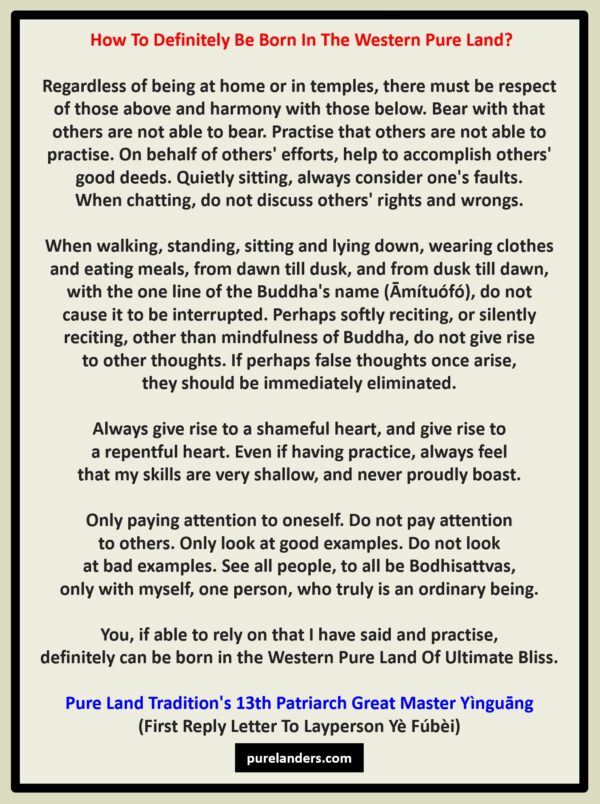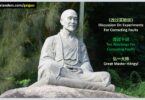

See section above the below at https://purelanders.com/2025/06/12/60-how-to-eliminate-stray-thoughts-with-mindfulness-of-buddha :
如何决定生西?
How To Definitely [Be] Born [In The] Western [Pure Land]?
无论在家在庵,必须敬上和下,
Regardless [of being] at home [or] in temples, [there] must [be] respect [of those] above [and] harmony [with those] below.
[Note 1: Even for the lowly and disagreeable, there should be respect of their hidden Buddha-nature, thus with harmony, in hope that they can discover their Buddha-nature, or that we can help them do so.]
忍人所不能忍,行人所不能行。
Bear [with] that others [are] not able [to] bear. Practise that others [are] not able [to] practise.
[Note 2: What should be borne patiently should be borne patiently, even if others are not able to do so. What should be practised should be practised, even if others are not able to do so.]

代人之劳,成人之美,
On behalf of others’ efforts, [help to] accomplish others’ good deeds.
[Note 3: Whenever possible, assist in helping others to do good, and to be pure. This itself assists us to do good, and to be pure.]

静坐常思己过,闲谈不论人非。
Quietly sitting, always consider one’s faults. [When] chatting, [do] not discuss others’ rights [and] wrongs.
[Note 4: If not frequently reflecting upon our own mistakes, we are likely to continue making mistakes, or make worse ones. The only exception for discussion of others’ right and wrongs that is constructive would be for finding ways to help them to realise their mistakes. All other ‘discussions’ are either useless, or are with destructive gossip and speculation.]
行住坐卧,穿衣吃饭,从朝至暮,从暮至朝,一句佛号,不令间断。
[When] walking, standing, sitting [and] lying down, wearing clothes [and] eating meals, from dawn till dusk, [and] from dusk till dawn, [with the] one line [of the] Buddha’s name [i.e. Āmítuófó (阿弥陀佛)], [do] not cause [it to be] interrupted.
[Note 5: Mindfulness of Buddha can be practised with profound Faith (深信) and sincere Aspiration (切愿) in all postures, when doing all activities, and at all times, as much as possible, so as to permeate our lives with the purest mindfulness. Other than scattered mindfulness (散心念) practised while doing something else, there should also be focused mindfulness (专心念) practised too, when doing nothing else, so as to grow in wholehearted concentration.]
或小声念,或默念,除念佛外,不起别念。
Perhaps softly reciting, or silently reciting, other [than] mindfulness [of] Buddha, [do] not give rise [to] other thoughts.
[Note 6: Silent recitation is more appropriate in some situations, such as when eating and lying down, the latter of which can harm breathing if done for long (according to another teaching by the Great Master). When situations are deemed disrespectful or hard to be sincere, recitation should be ceased, practised softer or silently.]
若或妄念一起,当下就要教他消灭。
If perhaps false thoughts once arise, [they] should immediately [be] eliminated.
[Note 7: The way to overcome stray thoughts is to not create more stray thoughts about them, but by eradicating them immediately, with return to wholehearted mindfulness of Buddha.]
常生惭愧心,及生忏悔心。
Always give rise [to a] shameful heart, and give rise [to a] repentful heart.
[Note 8: It is only when we have self-reflection, that there can be healthy moral shame, for recognising our defiled ways, so as to give rise to remorse, to repent sincerely, and to make amends.]
纵有修持,总觉我工夫很浅,不自矜夸。
Even if having practice, always feel [that] my skills [are] very shallow, [and] never proudly boast.
[Note 9: As long as we are not yet Buddhas, we should see our practice to be lowly, having no ground to be arrogant at all. This is while the Buddhas who have perfected their practice with realisation of non-self are not prideful at all. Why then, should we ever be proud?]
只管自家,不管人家,
Only pay attention [to] oneself. [Do] not pay attention [to] others.
[Note 10: Of course, if it is within our means to help others, we should. However, the priority should always be to manage ourselves well first. If we do not manage ourselves well enough, how can we help others well?]
只看好样子,不看坏样子。
Only look [at] good examples. [Do] not look [at] bad examples.
[Note 11: Instead of deliberately focusing on bad examples to do fault-finding to no end, which does no one any good, we should focus on recognising good examples to inspire our learning and practice. Being good examples as a result can inspire bad examples to be good too.]
看一切人皆是菩萨,唯我一人实是凡夫。
See all people, [to] all be Bodhisattvas, only [with] myself, one person, [who] truly is [an] ordinary being.
[Note 12: To imagine all to be manifested Bodhisattvas teaching you as the only non-Bodhisattva to be better with their good examples, and to not be worse with their bad examples is a powerful way to humbly learn from everyone.]
汝果能依我所说而行,决定可生西方极乐世界。
You, if able [to] rely on that I [have] said and practise, definitely can [be] born [in the] Western [Pure] Land [Of] Ultimate Bliss.
[Note 13: With the above understanding and attitude in practice, Pure Land certainly will be within reach.]
净土宗十三祖印光大师
Pure Land Tradition’s 13th Patriarch Great Master Yìnguāng
《印光法师文钞》(三编):复叶福备书;
Dharma Master Yìnguāng’s Collected Writings (Third Compilation): Reply Letter [To] Yè Fúbèi;
印光大师文钞菁华录(第六十):三、示修持方法:甲、示念佛方法(第八则)
Record [Of] Great Master Yìnguāng’s Collected Writings’ Essence (60th Short Section): 3rd [Chapter]: Guidance [On] Practice Methods: First, Guidance [On] Mindfulness [Of] Buddha’s Methods (8th Short Section)
[Ref: #60 / 3.1.8]
Namo Amituofo : Translation and note by Shen Shi’an
相关典籍
Related Text:
《印光大师文钞菁华录》
Record Of Great Master Yìnguāng’s Collected Writings’ Essence
https://purelanders.com/jinghualu





